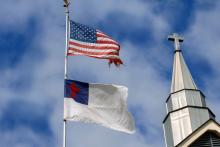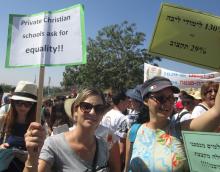Christian schools

I spent a year collecting ethnographic data in a predominantly white, conservative, Christian K-12 school. It troubled me that my tax dollars were being used to support the kinds of teaching and discriminatory admissions practices I witnessed.

On Dec. 30, 1959, over 3,000 Christian students gathered in Athens, Ohio, at the 18th Ecumenical Student Conference. Participating youth leaders and activists developed methods of engaging with social and political transformations at the turn of the 1960s. One of the key speakers was a 30-year-old Baptist preacher who emphasized a religious as well as civic prerogative for students, claiming: “whenever a crisis emerges in history, the church has a role to play.” While the specific crisis Martin Luther King Jr. referred to was the fight for civil rights in the segregated American South, he urged Christian students to challenge injustice undergirding all systemic discrimination, oppression, and racism at home and abroad.

Students at Biola University and Oklahoma Baptist University assembled Feb. 9 in order to protest their colleges’ requests to be exempt from Title IX requirements that prohibit discrimination on the basis of sexual orientation and gender identity. As many as 60 Christian schools have submitted similar requests since 2014, when the Justice Department announced that Title IX protections extended to transgender students.

Israel’s 47 Christian schools are entering the second week of an open-ended strike to protest ongoing cuts in government allocations, which they attribute to government discrimination against minority religious groups.
The schools, 40 of them Catholic, teach 33,000 Christian and Muslim Arab students in central and northern Israel.
Officials from various Christian denominations called the strike on Aug. 31, after nearly two years of negotiations with the Ministry of Education failed to convince the government to reinstate the funding it has withdrawn from the country’s semi-private schools during the past six years.
SUMMER IS THE season for high school football practice. Two years ago, the players at Central Catholic High School in Portland, Ore., got a different kind of coaching, brought in by head coach Steve Pyne. For the first time, U.S. Army recruiters would serve as volunteers to run the football team through their strength and conditioning paces—helping them prepare for the annual “Holy War” matchup against archrival Jesuit High School.
According to an article in the U.S. Army’s monthly Recruiter Journal, the Army “footprint” for the big game included a Humvee parked outside the stadium and a pre-kickoff event in which local recruiters placed “unit patch decals from various Army divisions” onto players’ helmets.
“Not once at practice did we talk about the Army,” said one of the recruiters. “It wasn’t about the Army. It was about how we can integrate ourselves into the community in a way the community will accept us and not feel like we are a threat.”
In recent years, the Pentagon’s military recruiting capabilities have experienced a quantum leap—including unprecedented access to Christian high schools. Not only are military recruiters using football to gain entry into parochial schools, but they are increasingly relying on military testing in schools to access students’ private information without parental consent.